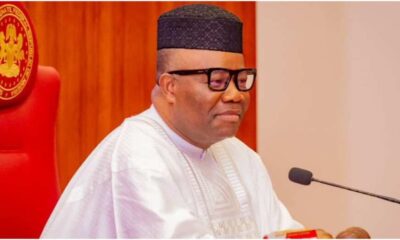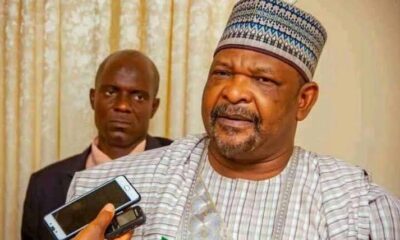- FG Recorded N3.4tn Fiscal Deficit in 2018
Between January and December last year, the Federal Government recorded a fiscal deficit of N3.4tn in its operations, figures obtained from the Central Bank of Nigeria have revealed.
The 2018 budget, signed by President Muhammadu Buhari on June 20 last year, had total spending of N9.1tn.
It is made up of N2.87tn for capital expenditure, N3.51tn for recurrent (non-debt) expenditure while N2.01tn was budgeted for debt servicing.
The N9.1tn budget was expected to be financed from N2.99tn to be generated from oil revenue, N31.25bn from Nigeria Liquefied Natural Gas dividend while N1.17bn was expected to be realised through revenue from minerals and mining.
To fund the budget, the Federal Government had planned to generate N658.55bn from Companies Income Tax, N207.51bn from Value Added Tax, N324.86bn from Customs while N57.87bn was expected to come from federation account levies.
In the same vein, the government was expected to raise N847.95bn through independent revenue from its agencies, while tax amnesty income, signature bonus and unspent balance from previous years was to provide N87.84bn, N114.3bn and N250bn respectively
Details of the fiscal operations of the Federal Government as contained in the CBN economic report for the fourth quarter of 2018 showed that the government had not been able to generate adequate revenue to meet its expenditure.
For example, in the first quarter of last year, the Federal Government’s retained revenue was put at N884.88bn while it’s expenditure was N2.01tn. This resulted in a fiscal deficit of about N1.13tn.
In the second quarter of last year, the Federal Government earned N1.12tn while it’s expenditure was N1.63tn, resulting in a deficit of N504.8bn.
For the third quarter, the revenue of the Federal Government was put at N1.03tn with the expenditure of N1.89tn, leading to a deficit of N855.09bn.
For the fourth quarter, the fiscal deficit widened to N910.4bn as the government was only able to generate N916.44bn to take care of its total expenditure of N1.82tn.
The report read in part, “The Federal Government retained revenue for the fourth quarter of 2018 was estimated at N916.44bn.
“This was below the proportionate quarterly budget estimate and the receipts in the preceding quarter by 51.5 per cent and 11.5 per cent, respectively.
“Of the total revenue, the Federation Account accounted for 90.4 per cent, while Value Added Tax, Excess crude/Petroleum Profit Tax,
Federal Government Independent Revenue, Excess Non-oil and Exchange Gain accounted for 4.3, 3.5, 1.4, 0.3 and 0.1 per cent, respectively.
The estimated Federal Government expenditure for the fourth quarter of 2018 stood at N1.82tn and was below the proportionate quarterly budget estimate of N2.37tn by 23.1 per cent and the level in the preceding quarter by 3.4 per cent.
“A breakdown of the total expenditure showed that the recurrent component accounted for 87.8 per cent, while capital and statutory transfers accounted for 5.9 and 6.3 per cent, respectively.
“A further breakdown of the recurrent expenditure showed that the non-debt component accounted for 53.8 per cent, while debt service payments were 46.2 per cent.”
The Minister of Finance, Mrs Zainab Ahmed, had last month while unveiling a Strategic Revenue Growth Initiative aimed at boosting the level of revenue generation, said the government was concerned about the inability of some of its agencies to meet their revenue target.
She admitted that it had become a challenge for the government to mobilise fiscal resources to deliver on its developmental objectives, adding that President Muhammadu Buhari had directed that revenue generation needed to be enhanced.
She said while oil revenue to oil Gross Domestic Product ratio stood at about 39 per cent, non-oil revenue to non-oil GDP was about 4.2 per cent.
The finance minister explained that the country’s VAT revenue to GDP stood at less than one per cent, noting that this was low when compared to the ECOWAS average of 3.4 per cent.
In terms of excise revenue, she said at 4.1 per cent, revenue generated from excise duty in Nigeria was low compared to Ghana at 15.3 per cent and Kenya at 19.5 per cent.
She said, “Nigeria’s low revenue generation capabilities have been an enduring challenge to the past and present governments.
“Although we are celebrated as the country in Africa with the largest economy, translating this wealth into revenues remains a challenge.
“We have, therefore, faces difficulty in mobilising domestic funds necessary for human capital development and infrastructure that are both drivers of sustainable economic growth.
“Our current revenue to Gross Domestic Product ratio of about seven per cent is unsatisfactory and we are keen on exerting all efforts in turning this around.”
Ahmed said she had tasked the ministry of finance and its agencies to identify what could be done to turnaround the current revenue situation.

 Billionaire Watch3 weeks ago
Billionaire Watch3 weeks ago
 Startups4 weeks ago
Startups4 weeks ago
 News4 weeks ago
News4 weeks ago
 News4 weeks ago
News4 weeks ago
 Bitcoin4 weeks ago
Bitcoin4 weeks ago
 Naira4 weeks ago
Naira4 weeks ago
 Forex3 weeks ago
Forex3 weeks ago
 Treasury Bills4 weeks ago
Treasury Bills4 weeks ago



























